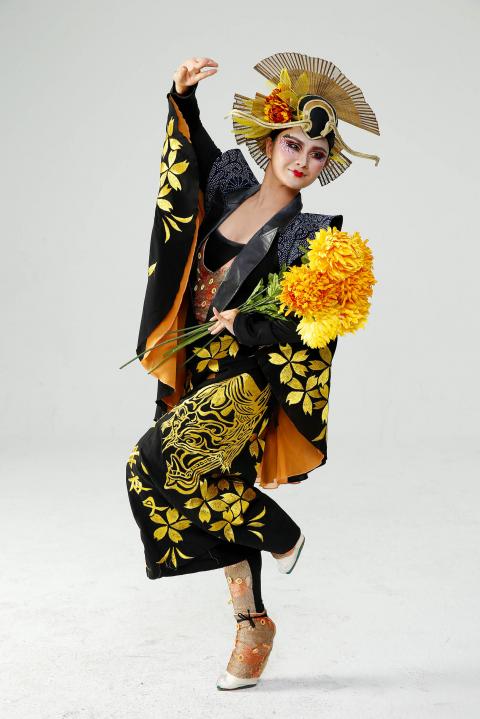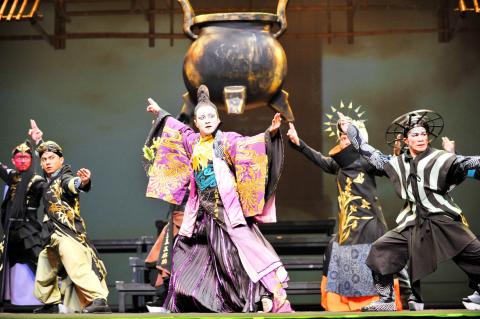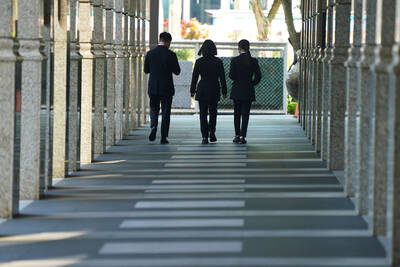The tales of Song Jiang (宋江) and his fellow outlaws are probably far better known to the Chinese-speaking world than those about his fellow icon, England’s Robin Hood, having been immortalized in the 14th-century novel The Water Margin (水滸傳), also known as Outlaws of the Marsh.
Like Robin Hood, Song and his group — which grew from the original 36 to 108 in later retellings — were seen as champions of the common people against a corrupt and repressive government, in his case, the Song Dynasty.
Song is also remembered as an innovative military commander who required his men to hold mock drills to train them in fighting techniques, drills that Chinese armies later adopted as a regular exercise and eventually became stylized rituals used by Taoist temples when honoring deities birthdays, events that can still be seen in Taiwan today, especially in the south.

Photo Courtesy of Contemporary Legend Theatre
The Water Margin tells of how Song’s group, which included “bandits,” former soldiers and scholars and others gathered at Mount Liang, where they battled Song forces until they eventually surrendered and were granted amnesty — on the condition that they then help the government fight other rebels and foreign invaders.
More than a decade ago, the Contemporary Legend Theatre (當代傳奇劇場), Taiwan’s jingju (Beijing opera, 京劇) fusion troupe joined forces with novelist Chang Ta-chun (張大春) and Mando-pop star and composer Wakin Chau (周華健) to create the first show in what was planned as a trilogy based on The Water Margin.
Artistic director Wu Hsing-kuo (吳興國) had already built a reputation for modernizing traditional Beijing opera productions and versions of Western classics, including several of William Shakespeare’s works, but the first installment of 108 Heros: Tales from the Water Margin (水滸108) was a bold mix of opera, rock music, break dancing and cosplay fashion.

Photo Courtesy of Contemporary Legend Theatre
The show opened in 2007 and was a huge hit for the troupe. It was followed by part II — The Hall of Righteousness (水滸108 II: 忠義堂), which opened in Hong Kong in 2011 before being performed at the National Theater in Taipei, while part III — The Final Battle (水滸108 III: 蕩寇志) premiered in 2014.
Wu teamed up again with Chang and Chau to revive part II, The Hall of Righteousness for a three-city tour, which opened on Friday last week at the Eternal Golden Castle (億載金城) in Tainan for two outdoor shows.
The company returns to the National Theater tonight for four shows and then will take the production to the National Taichung Theater in June.
While the show is a revival, Wu, starring as Song Jiang, has a brand new cast of young Taiwanese jingju stars, each of whom will play two or three roles.
The two-act show, which runs two hours and 20 minutes, including intermission, consists of eight scenes.
The story is told through a series of flashbacks and montages, helped by video projections. Chau’s rock compositions back up the traditional string and gong Beijing opera musicians.
The first act tells of how Song established himself as leader of his gang and his war against the government; it focuses on the “bright and dark” sides of his personality.
The second act features a temple ritual and a banquet, during which a drunk Song sings of his veneration for the government and his hopes of one day winning amnesty, something that does not go down well with his merry band of outlaws.
The stage design was created by Austin Wang (王孟超), with lighting by Huang Tsu-yien (黃祖延), costumes by Lai Hsuen-wu (賴宣吾) and choreography by Wu’s wife, Lin Hsiu-wei (林秀偉).
The show will be performed in Mandarin, with Chinese and English surtitles

JUNE 30 to JULY 6 After being routed by the Japanese in the bloody battle of Baguashan (八卦山), Hsu Hsiang (徐驤) and a handful of surviving Hakka fighters sped toward Tainan. There, he would meet with Liu Yung-fu (劉永福), leader of the Black Flag Army who had assumed control of the resisting Republic of Formosa after its president and vice-president fled to China. Hsu, who had been fighting non-stop for over two months from Taoyuan to Changhua, was reportedly injured and exhausted. As the story goes, Liu advised that Hsu take shelter in China to recover and regroup, but Hsu steadfastly

Taiwan’s politics is mystifying to many foreign observers. Gosh, that is strange, considering just how logical and straightforward it all is. Let us take a step back and review. Thanks to the Chinese Nationalist Party (KMT) and the Taiwan People’s Party (TPP), starting this year people will once again have Christmas Day off work. In 2002, the Scrooges in the Democratic Progressive Party (DPP) said “bah, humbug” to that. The holiday is not actually Christmas, but rather Constitution Day, celebrating the enactment of the Constitution of the Republic of China (ROC) on December 25, 1947. The DPP and the then pan-blue dominated legislature

Focus Taiwan reported last week that government figures showed unemployment in Taiwan is at historic lows: “The local unemployment rate fell 0.02 percentage points from a month earlier to 3.30 percent in May, the lowest level for the month in 25 years.” Historical lows in joblessness occurred earlier this year as well. The context? Labor shortages. The National Development Council (NDC) expects that Taiwan will be short 400,000 workers by 2030, now just five years away. The depth of the labor crisis is masked by the hundreds of thousands of migrant workers which the economy absolutely depends on, and the

If you’ve lately been feeling that the “Jurassic Park” franchise has jumped an even more ancient creature — the shark — hold off any thoughts of extinction. Judging from the latest entry, there’s still life in this old dino series. Jurassic World Rebirth captures the awe and majesty of the overgrown lizards that’s been lacking for so many of the movies, which became just an endless cat-and-mouse in the dark between scared humans against T-Rexes or raptors. Jurassic World Rebirth lets in the daylight. Credit goes to screenwriter David Koepp, who penned the original Jurassic Park, and director Gareth Edwards, who knows